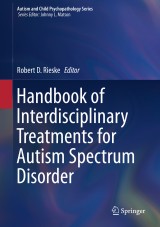Details

Handbook of Interdisciplinary Treatments for Autism Spectrum Disorder
Autism and Child Psychopathology Series
|
CHF 295.00 |
|
| Verlag: | Springer |
| Format: | |
| Veröffentl.: | 29.04.2019 |
| ISBN/EAN: | 9783030130275 |
| Sprache: | englisch |
Dieses eBook enthält ein Wasserzeichen.
Beschreibungen
<div><p>This handbook examines the medical and therapeutic needs of individuals with autism spectrum disorder (ASD) and the effectiveness of treatments that are delivered through interdisciplinary teams. It analyzes the impact of interdisciplinary teams on assessment, diagnosis, treatment planning, and implementation and explores how evidence-based treatments can be developed and implemented. Chapters describe the wide-ranging effects of ASD and the challenges individuals and their family members face when seeking treatment. In addition, chapters provide an overview of the comorbidities and related disorders that often accompany ASD, including neurodevelopmental disorders, medical and behavioral problems, and psychopathology. The handbook also discusses the critical importance of caregivers in the treatment team as experts in their child’s strengths, problem areas, and functioning. </p><p>Topics featured in this handbook include:</p><p></p><ul><li>Legal considerations in interdisciplinary treatments.<br></li><li>Ethical considerations in the development and implementation of interdisciplinary teams.<br></li><li>Evidence-based interdisciplinary treatment and evaluation considerations.<br></li><li>The role of primary care physicians and subspecialty pediatricians within interdisciplinary teams. <br></li><li>The impact of school psychologists related to assessment and intervention development. <br></li><li>Vocational interventions that promote independence in individuals with ASD. </li></ul><p></p><p>The <i>Handbook of Interdisciplinary Treatments for Autism Spectrum Disorder</i> is a must-have resource for researchers, clinicians and professionals, and graduate students across such interrelated disciplines as clinical child, school, and developmental psychology, child and adolescent psychiatry, social work, rehabilitation medicine/therapy, pediatrics, and special education. </p></div><div><br></div><br>
<div>Chapter 1. Interdisciplinary Teams and Autism Spectrum Disorder.- Chapter 2. Evidenced-Based Practices.- Chapter 3. Comorbidity and the Need for Interdisciplinary Treatments.- Chapter 4. Ethical Considerations in Interdisciplinary Treatments.- Chapter 5. Legal Considerations in Interdisciplinary Treatments.- Chapter 6. Interdisciplinary Diagnostic Evaluations.- Chapter 7. Applied Behavior Analysis and Related Treatments.- Chapter 8. Interdisciplinary Treatment for Pediatric Feeding Disorders.- Chapter 9. Interdisciplinary Treatment for Pediatric Elimination Disorders.- Chapter 10. Development of the Interdisciplinary Treatment Team.- Chapter 11. Psychology.- Chapter 12. Primary Care Physicians/Sub-Specialty Pediatricians.- Chapter 13. Speech-Language Pathology.- Chapter 14. Occupational and Physical Therapy.- Chapter 15. Dietetics/Nutrition.- Chapter 16. Gastroenterology.- Chapter 17. Oral Health-- Chapter 18. School Psychology and Education Professionals.- Chapter 19. Vocational Interventions.- Chapter 20. Neurologic Music Therapy.- Chapter 21. Recreational Therapy.- Chapter 22. Social Work.- Chapter 23. Family Therapy.- Chapter 24. Family Inclusion. </div>
<p><b>Robert D. Rieske, Ph.D.,</b> is an Assistant Professor in the Department of Psychology at Idaho State University in Pocatello, Idaho. His research focuses on the identification, assessment, and treatment of individuals with intellectual and developmental disabilities with a special emphasis in autism spectrum disorder and comorbid psychopathology. His research includes collaboration with several areas of study outside of psychology to provide a more interdisciplinary team approach to assessment and treatment and more effective services for this unique population. He currently serves as an associate editor for the <i>Review Journal of Autism and Developmental Disorders</i> (Springer) and founding member of the ISU Collaboration for Autism Research, Education, and Support</p>
<p>This handbook examines the medical and therapeutic needs of individuals with autism spectrum disorder (ASD) and the effectiveness of treatments that are delivered through interdisciplinary teams. It analyzes the impact of interdisciplinary teams on assessment, diagnosis, treatment planning, and implementation and explores how evidence-based treatments can be developed and implemented. Chapters describe the wide-ranging effects of ASD and the challenges individuals and their family members face when seeking treatment. In addition, chapters provide an overview of the comorbidities and related disorders that often accompany ASD, including neurodevelopmental disorders, medical and behavioral problems, and psychopathology. The handbook also discusses the critical importance of caregivers in the treatment team as experts in their child’s strengths, problem areas, and functioning. </p><p>Topics featured in this handbook include:</p><ul><li>Legal considerations in interdisciplinary treatments.<br></li><li>Ethical considerations in the development and implementation of interdisciplinary teams.<br></li><li>Evidence-based interdisciplinary treatment and evaluation considerations.<br></li><li>The role of primary care physicians and subspecialty pediatricians within interdisciplinary teams.<br></li><li>The impact of school psychologists related to assessment and intervention development.<br></li><li>Vocational interventions that promote independence in individuals with ASD.</li></ul><p>The <i>Handbook of Interdisciplinary Treatments for Autism Spectrum Disorder</i> is a must-have resource for researchers, clinicians and professionals, and graduate students across such interrelated disciplines as clinical child, school, and developmental psychology, child and adolescent psychiatry, social work, rehabilitation medicine/therapy, pediatrics, and special education.</p>
Examines broad-ranging medical and therapeutic needs of individuals with autism spectrum disorder Details enhanced effectiveness of treatments delivered through interdisciplinary behavioral, medical and educational teams Explores effects of ASD across developmental systems (e.g., social, cognitive, and physical) Addresses the myriad challenges individuals and their family members confront seeking treatments for ASD
Diese Produkte könnten Sie auch interessieren:

Der gesundheitspolitische Stellenwert der Tiergestützten Therapie in Deutschland

von: Nadine Kahlert

CHF 14.00















